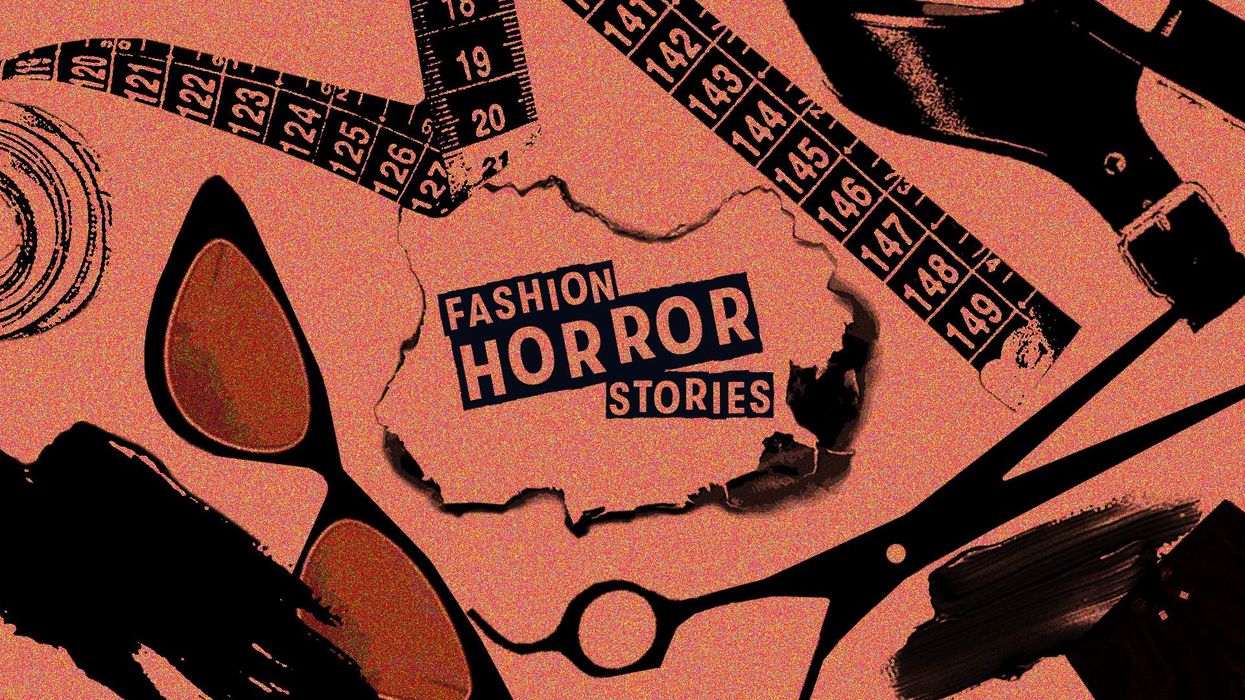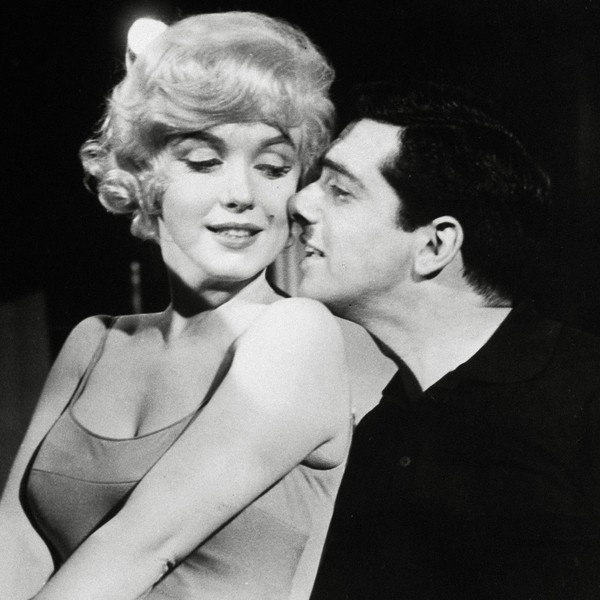When Your Boss is a Walking Jump Scare
How many times have you cried in a sales meeting?

The fashion industry is known for its volatile creatives and unshakable self-seriousness. If you ask anyone who’s worked in fashion or at a magazine if it’s like The Devil Wears Prada, they will likely tell you that’s a G-rated shadow of their lived experience. With our generation’s waning patience with abusive workplaces and megalomaniac bosses, these stories from our collective past are taking on a new light. Often dismissed flippantly as part of “paying our dues,” fashion veterans and current employees alike are re-examining their experiences with newfound clarity. Somehow, even in this relatively progressive era we’ve entered, the fashion industry remains one of the last bastions of unchecked and wildly inappropriate behavior. From former fashion interns to magazine assistants to models, we’re compiling an oral history of fashion workplace experiences in the series Fashion Horror Stories.
After hearing about Anthony’s debauched Fashion Week nights in Milan, we’re following up with his second experience at a New York-based fashion magazine:
After leaving your last magazine (following that wild night in Milan), how did you land your second magazine job?
“After I left the first magazine, I was recruited in 2005 to work at another big-name fashion publication. They were really going after me because they knew I had a great client list. I kept getting calls from people saying, ‘They really, really want you!’ And I was like, ‘But I don’t want to work with them. I’ve heard horror stories about them.’ They argued with me, ‘No, no, no, you need to work for them because if you can get through working with these people, everyone else in the industry will know that they couldn’t break you.’ That’s how the fashion industry was at the time. If you can go and endure the custody of these horrendous people… you won, I guess? It was pretty much spelled out: getting abused is an opportunity for you to get somewhere else.
“I had one main boss but he also had a few direct reports who sort of spoke for him at times, even when he was in the room. For the sake of anonymity, I’ll call him Humpty Dumpty. Humpty was known to make grown adults cry in sales meetings.”
What type of asshole was he? Can you describe the behavior?
“I saw the first glimmer of ugliness about a month into being there. I got off the lift and went into the little kitchen area—it was narrow but long. Humpty always wore a comically large gold BVLGARI watch and tapped on it with a Cartier jeweled pen when he was nervous, observing people, or just walking around the office. We always knew he was coming because I would hear the tapping when he walked—it served as an alarm to get out of the way. I heard the tapping when I rounded the corner and saw him on his hands and knees. He’d opened up the ice drawer under the fridge and was chipping at it with one of those clear plastic scoopers. I heard him mumbling obscenities as he hacked at it, ‘Fucker, fucking asshole, motherfucking cunt.’ Just a litany of swears. Seeing him in a moment where he thought he was alone—it was one of those rare experiences where you are very acutely aware of someone’s true personality. It was horrifying.
“So I was trying to walk really quietly behind him, but as I stepped down on a floorboard and remembered in that instant: fuck, this one squeaks. He spun around, and without even saying hi or anything, he says, ‘How long have you been standing there?’ His eyes were wide and crazy. I can’t remember what I said, but I kind of slinked away. That was the beginning of my understanding of who he was, and it just went downhill from there.”
How did this behavior come out in his interactions with the staff?
“On the sales team, we had a big group meeting every Monday, but one-on-one meetings with Humpty on Thursday. Since I had the biggest piece of business at the magazine, my meeting was more intense than anyone else’s. Humpty’s assistant, Martin, someone who always seemed socially castrated by Humpty as he would not speak unless spoken to and would not look at your eyes unless directly addressed, would sit in on these one-on-one meetings because Humpty wouldn’t talk to you directly. While you sat all the way across a giant conference room table, he would close his eyes—when this meeting started, you weren’t worth looking at. He seemed pained if he could sense your presence. Not only would he not look at you, he wouldn’t talk to you. He would only speak through Martin. He would just sit there with his eyes closed, tapping his Cartier pen on his giant gold BVLGARI watch, and go, ‘Martin, can you please ask him about Bottega Veneta.’ Then Martin would say, ‘Anthony, what’s the news on Bottega Veneta?’ He wouldn’t deign to talk to you directly even though you were right across the table.
“Even if you were doing well, Humpty would always try to trip you up—he had so much negative energy that didn’t have anywhere to go, and it would just be vomited up on you. During one of my one-on-one meetings, Martin could not keep up with Humpty’s questions and just…stopped, his face turning red and purple. I thought at long last Martin had finally had it, but instead, he just exhaled so dramatically that spittle shot out of his mouth and onto the conference room table—all the while Humpty kept bitching.
“At that point, I just burst out laughing. They remained completely silent, but I couldn’t regain my composure, and honestly, I didn’t care. I realized how absurd it all was, and I couldn’t fight the reaction anymore.”
What made him such a powerful fixture in fashion at the time?
“In that era, fashion was all about personal relationships, and Humpty had relationships with all the designers. Nowadays, everything is so spread out and compartmentalized with marketing, but back then, it was about who you knew and what you could get with a phone call.
“No one was safe from his ire, though, not even big-name designers. Once, I was in a cab with Humpty and Martin. Humpty started talking about a party he went to at a famous jewelry designer’s home. He said, ‘[Redacted Designer Name]’s wife is awful, just awful. Their apartment is filthy. It was disgusting. The food that they gave us was disgusting. There was dirt everywhere. How can you invite people over to your apartment when it’s dirty? I ran my finger along the cabinet in the bathroom, and it left a trail. It was disgusting.’ Now, I’m sure their apartment was not disgusting. Humpty just wanted to cut everything and everyone down. He was such a miserable soul.”
How do you think people become like that? It seems like after interviewing several people about their fashion bosses, they all become these vicious, impatient, critical monsters. What do you think creates this type of person?
“I think the industry molded them, and over time, the dynamic of bitchiness and exclusivity makes it so only the smart, determined, and corrupt succeed. Since he had relationships with all the designers, part of my job, effectively, was to be a personal assistant to them—and cater to them and Humpty loved that shit.”
In what ways did he treat everyone like a personal assistant?
“Humpty would come over to my desk often—I knew he was there because I could see him in the reflection of the window. To get my attention, he would tap his diamond and ruby-encrusted Cartier pen against his gold BVLGARI watch like he was about to give a toast. I immediately had to hang up the phone, no matter who I was talking to.
“One day, he came up behind me and asked, ‘Did you make a lunch meeting with [redacted] from Dior?’ I knew I was in trouble. He continued, ‘You fucking know that I’m at the show, and I can’t go from here to there, and there to there with enough time to make it to lunch. It doesn’t even make sense.’ I calmly responded, ‘Well, Humpty, I already timed it. The show is here, and your lunch is here, dah dah dah–’ I explained to him that I had already thought it all through without any timing conflicts or double-bookings. Then he said, ‘You know what? I knew I liked you. This is why I like you.’ He turned and walked away, and all I could think was, ‘You’re a fucking nightmare.’”
Between your boss at the former magazine and Humpty, how would you compare those experiences?
“In terms of how I was treated, my former boss treated me worse. With Humpty, I could navigate his expectations in advance, but my other boss was mercurial—he would blame me and admonish me for things that I wasn’t even involved with. Humpty was a horrible, bitter person, but you could learn to deliver what was expected—no matter how ridiculous it was. And honestly, sometimes it was even funny.”
How did you end up leaving the magazine?
“I had enough one day and just told them I wanted to ‘take some time off’ and I wanted to leave. Humpty would not speak to me. I told Martin and then Martin sent me to HR. The HR director asked ‘What took you so long?’ and sort of giggled under her breath. I laughed too–in that moment all of it was so ridiculous. How could I have taken it seriously? I had a great reputation and had made it through almost two years with Humpty–that is more than most.”
Did you ever see Humpty again?
“No, but to this day, I will randomly hear that ‘tap, tap, tap’ of the Cartier pen on the BVLGARI watch and tense up in horror. Once I realize that it’s not real, I start laughing. I guess I’m just sick enough to like being scared sometimes. Maybe that’s why I worked for Humpty?”




